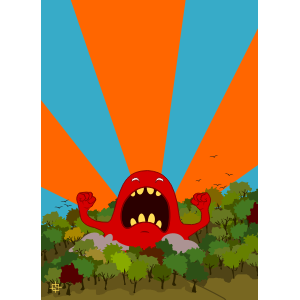It seems I put the wrong information with the image I chose for Thing 15. Turns out it was not protected by the licence I described but is in fact under Public Domain. So there’s another Thing I’ve learned this week 🙂
How can you treat your PhD like a project?
StandardFrom the always helpful thesis whisperer comes this gem of advice. I hope I’m approaching the “painting by numbers” category 🙂
Fiona Saunders is a Senior Lecturer in the Management of Engineering Projects at The University of Manchester and a part-time PhD student. Her research interests are in the management of projects in safety-critical industries. Prior to academia, Fiona enjoyed a successful 15 year industry career in project management. Fiona blogs at www.fionasaunders.co.uk where the original version of the post was published, along with a follow up post.
Long before I threw caution to the wind and (as a mum with 2 small children) began my part-time PhD my Professor (@AndrewWGale) gave me a very wise piece of advice “Don’t be afraid of a PhD, it’s really just a project”. Now that I am entering the 3rd year of my part-time PhD I want to reflect on the similarities between a PhD and a project and offer some tips on how to use the tools and techniques of project…
View original post 898 more words
THings 14 and 15, Sharing images
StandardI’ve chosen this image because it pretty much sums up how I feel when I look at my “To do before December” list!
This image was created by Hector Gomez,
https://openclipart.org/detail/72379/monster-screaming-by-hector-gomez
Thing 12
StandardOh the agony of making decisions! It took me ages to decide what to put on slide share! One of the issues with publishing my current doctoral research in a public forum is that I’m at the analysis/writing stage and my thinking keeps evolving so rapidly that I don’t want to commit to sharing it with anyone in case I live to regret it. So I’ve uploaded an edited version of a presentation I gave based on my M.Ed research into the ways early childhood teachers might seek to foster children’s spirituality in their practice. The link is:
Using slideshare
StandardFollowing on from my previous rambles about story telling, inspired initially by the blog Thinking about Ideas, I found this presentation on Slideshare:
It speaks to the idea of stories, and using social media to share stories in order to develop a sense of community- in the context of a faith-based early childhood centre. All of which covers two of my major pre-existing interests – early childhood education and children’s spirituality, and cunningly integrates them with my new-found interest in social media and the stories we tell there.
Why you should use Twitter during your PhD
StandardFor those of you who may not follow the thesis whisperer, here is further justification for anyone with a newly developing twitter addiction! Enjoy 🙂
This post is by Sheree Bekker, who is originally from South Africa and now based in Australia as an international PhD scholar at the Australian Centre for Research into Injury in Sport and its Prevention (ACRISP), Federation University Australia. Her research centres around sports safety. Follow her on twitter @shereebekker
 Twitter, according to Wikipedia (yes – how terribly un-scientific of me), is an online social networking and micro-blogging service that enables users to send and read “tweets”, which are text messages limited to 140 characters. Twitter is vital to the success of your PhD. Yes, you heard me read me correctly, a seemingly superficial social media site is a fundamental element that will contribute to the success of your PhD – if you embrace it!
Twitter, according to Wikipedia (yes – how terribly un-scientific of me), is an online social networking and micro-blogging service that enables users to send and read “tweets”, which are text messages limited to 140 characters. Twitter is vital to the success of your PhD. Yes, you heard me read me correctly, a seemingly superficial social media site is a fundamental element that will contribute to the success of your PhD – if you embrace it!
Let me tell you my story.
I was a Masters student in South Africa, where I had completed my undergraduate studies and an Honours…
View original post 602 more words
Selective Storytelling
StandardHere’s the 23 things blogpost I referred to in my previous post, Careful Curating. It really made me think.
The Web 2.0 allows us to tell our stories in new ways, but it doesn’t change the principles of storytelling. Our stories still need to be interesting and relevant or our audience stops listening. The stories are still told with a purpose in mind, be it entertainment, information or challenge – or a mix. To do these things, the storyteller needs to be selective, and that is what I want to discuss in this post.
Recently I have been introduced to Storify.com (see JD Lasica, 7 top tools for content curation and Marcela De Vivo, 5 tools to curate content like a pro). This tool has been likened to a scrapbook (De Vivo) and is a way to present a story about a topic or event that presents “your overall take on the proceedings” (Lasica). For one event, then, there are many different stories that could be told…
View original post 675 more words
Careful curating.
StandardSince joining this course I have started to think more deeply about my identity as a researcher, and about how I want to communicate that identity to others. It seems that building an online identity is something that can be done in haste, only to be repented of at leisure.
In particular, there’s Twitter. I had never had anything to do with twitter before now. To be honest, I could not see the point of it. However, since signing up, I’ve discovered a whole new world of information, both good and bad. But more excitingly I’ve discovered a whole new world of possible contacts and networks to join. For instance, today I signed up for an online Shut Up and Write group hosted by an academic in Brisbane, for academic writers who wanted some encouragement to focus, and some support from others. This is well beyond anything I had expected to find on Twitter, which I had previously suspected was exclusively populated by celebrity watchers and trolls!!
But this whole new world raises two (at least) things to consider. The first is the issue of identity. How do I want to present myself; who do I want these other people to see? In the 23 Things blog, Thinking about Ideas, Suzanne talks about story – the things we include and the things we omit. I realise she’s not really talking about our personal stories, but I think what she says can be extended to that. For example: a couple of years ago I organised a meeting for Faculty of Ed postgrads, with a well-known guest speaker. We had such a high turnout, and so many responses from people who couldn’t make it but wanted to see it, that we asked permission to film the presentation and put it on the closed PGSA Facebook page. Permission was duly granted (and of course we had to get consent from everyone who attended just in case the back of their head featured in the film, but that’s a whole other story). However, we were then asked NOT to put the film up online, because it didn’t fit with the online presence the speaker was developing. That was my first encounter with this issue.
The second thing to consider is this question of curating content. Because I have spent a lot of time lately drowning in content, seeing things that interest me and then not being able to find them again. So I’m really keen to try out some of the tools recommended in thing 10. However, I’m going to have to wait. Time is short and deadlines are pressing!
In the meantime, I’m a bit unsure about how to create a link to another blog, so I’m going to reblog it in full.
When is it right to write?
StandardI’m always interested in advice about writing. Although the more time I spend reading this advice, the less time I seem to have to actually do any writing of my own. Weird or what?
When is it right to write?
This is a common source of anxiety amongst PhD researchers, not helped by the competitive nature of many writing challenges set on twitter. Whilst they can help some, they cause angst to many others. So should you write from the start of a PhD?
I am now 8 months in… and feel in a good place where I have found my feet. If you haven’t yet come across the excellent blog by Professor Pat Thompson, then Writing From Day One is Risky is recommended. The blog Three Month Thesis Why Writing From Day One is Nuts also caused me great relief.
The authors aren’t saying don’t write anything, they are saying don’t expect to write your thesis from day one. How could you? I am always shocked when people claim to have written 30,000 words in a week or have written 3 chapters in…
View original post 1,488 more words
Professional social networks.
StandardI already have an account with both LinkedIn and Academia.edu but I’m not sure what their value is to me at the moment.
I joined LinkedIn mainly to keep my daughter happy (she works in Recruiting and uses LinkedIn every day as part of her work). So far I’ve enjoyed setting up my profile and making connections with people I already know, but otherwise I’m maintaining an attitude of wait and see about it. I’ve worked through the suggestions about the 5 things you probably aren’t doing with your LinkedIn account (I wasn’t doing any of them) and I’m trying to make the suggested changes. I still have to think of some wickedly catchy headline!
I agree with the John Naughton article that LinkedIn is mainly associated in my mind with finding a job. I’m not in that position at the moment, and I haven’t really thought before about how i could use it to increase my profile as a researcher, or develop a professional network around discussion of ideas. So in light of the readings for this week I’ve joined a couple of groups from the list of suggestions, and I’ll try and make the effort to join the online discussions to become a participating member of the groups I belong to, rather than just a silent watcher.
As for Academia.edu – I joined that in order to get access to an academic paper I wanted to read. I currently have no idea how to use that particular site, and so my account just sits there. I think it might be staying dormant for the foreseeable future.
I’m interested to hear how others use/view these sites. As I said at the beginning of this course, I’ve never really ‘done’ social media, so perhaps I don’t appreciate the possibilities. I think the best way to really learn about them would be to hear other people’s stories.


